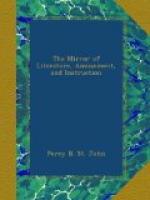* * * * *
RANSOMS.
(Concluded from page 149.)
The queen of Edward III., after the battle of Durham, demanded of John Copland, David of Scotland; on his remonstrance that no one but the king had a right to his prisoner, Edward sent for him to Calais, and bestowed on him in return for his captive, L500, in land. The Scottish monarch paid, after an imprisonment of eleven years, 100,000 marks, and was dismissed. Charles de Blois, at the same period paid 700,000 crowns, and left his two sons as hostages. Michael de la Pole, Duke of Suffolk, paid L20,000. sterling, when only a simple knight. Duc d’Alencon gave for his freedom 200,000 crowns, and actually sold part of his estate to the Duc de Bretagne to pay it. Caprice often caused the detention of men in captivity, from their inability to comply with the absurd demands of their captors. Louis XI. refused to part with Wolfang Poulain, a Burgundian officer, unless he would purchase his redemption with some favourite hounds belonging to the Seigneur de Bossu. As Bossu did not feel sufficiently interested in his friend’s welfare to comply with the king’s wishes, and part with his dogs, some time elapsed before any treaty could be entered into, to restore Poulain to his country.
This practice, though it undoubtedly contributed to soften the horrors of war, often caused hostilities to be undertaken on the most absurd and frivolous pretences. The English are represented by Comines as rejoicing in a war with France, from a recollection of the prices they obtained from the lords and princes they captured. Another bad effect may be traced to it, in the violations of safe conduct, the seizure of individuals during times of peace, which the middle ages so constantly exhibit. Oliver de Clisson, the Constable of France, on entering into a castle to examine its strength, at the request of the Duc de Bretagne, in 1387, was seized, and at first commanded to be thrown into the sea. The savage Breton afterwards being troubled in conscience, expressed his joy that his order had not been complied with, and released Clisson on the payment of 100,000 livres.
During the wars of Edward III. and Philip, many a soldier of fortune amassed considerable opulence by the ransoming of his prisoners. Croquart, a famous leader of these companies, is related to have become extremely rich by the money he received from the ransoms of castles and towns. In the fourteenth century several Knights of Suabia having associated themselves together for chivalrous engagements, endeavoured to seize a rich Count of Wirtenburg, as a means of procuring a noble sum of money for the ransom of himself and his family. For this purpose they attacked him in his castle at Wildbad, but were repulsed. At Poictiers, the King of France was nearly torn to pieces by the soldiers in disputing for their prize.




